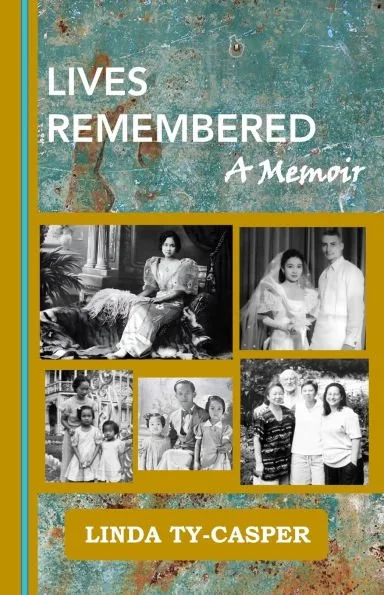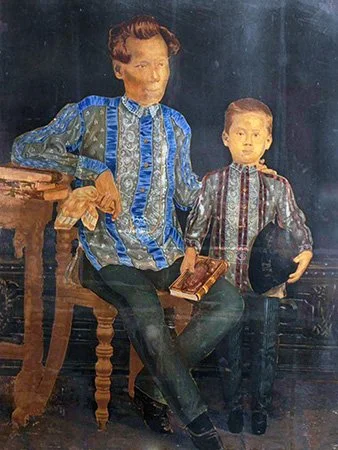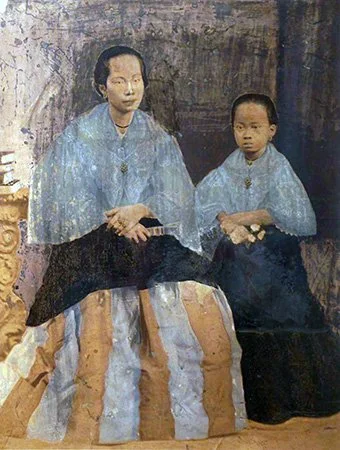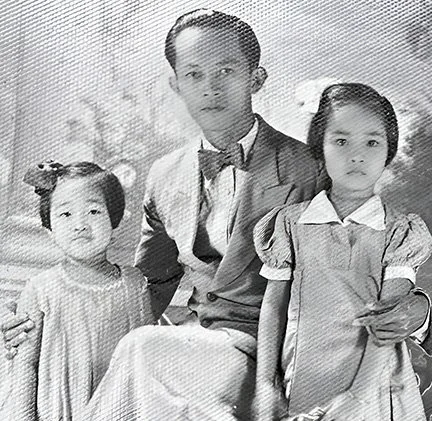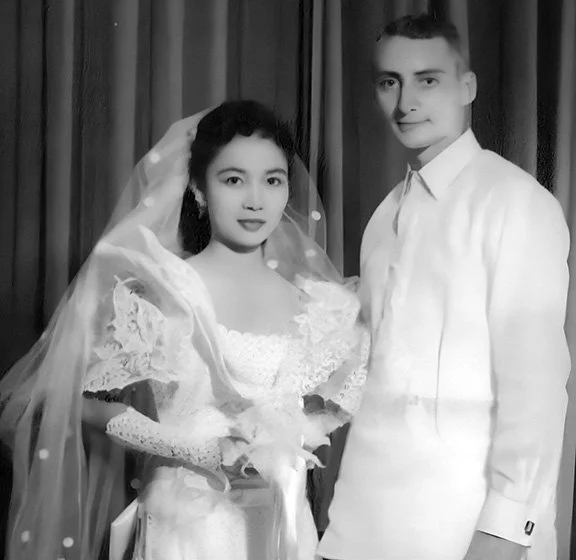Remembering a Life Well-Lived
/Book Review: Lives Remembered: A Memoir by Linda Ty-Casper. Santa Monica, California: PALH, 2025. 179 pages.
Ty-Casper confirmed this commitment and extended it to all her other works in an e-mail to me of February 28, 2025: “I always thought the writing should get the attention—it is about us... not the writer.” This outgoingness is not unexpected for those who have read her immediately previous book Will You Happen, Past the Silence, Through the Dark: Remembering Leonard Ralph Casper (PALH, 2022), which her preface describes as “the Memoir that Len did not get to write,” rather than her own biography of her late husband. She even inscribed my copy “For Lynn M. Grow – sharing Len's Memoirs – a communion of and in and through the literature he loved.” [my emphasis]
The first section of Part I of Remembered Lives, “Early Memories,” is a rhapsodic reminiscence so vivid that it can be envisioned as an Amorsolo painting. Nowhere else in her writings is there a comparable passage, drawing the reader in rather than the reader remaining a spectator.
In Part II of Lives Remembered, the “1984 Djerassi” section, provides a mesmerizing lyrical passage with a backdrop progression from Divine to individual to societal, a passage also unmatched elsewhere in Ty-Casper's work:
Raining. The light over the hill is like a halo. I thought of Nanay's stories about processions. I watched the halo getting narrower, a worn wedding band like the one on her finger...I remember the tray of wedding rings in the Brattle Street antique shop, Cambridge...heaped like roasted cashews sold in Manila sidewalks.
Rain and a bird singing. A red madrona repeating the shape of hills. The sun a soft moon. Olive trees in groups. Redwoods growing out of clumps cut a hundred years ago when sawmills dotted the hills. Rain running down the branches of the redwood beside the lamppost.
The poetic quality of this passage lies in its makeup of the single word “Raining” and then in the first paragraph a mixture of complete sentences and phrases; in the second paragraph, all units are fragments. The allusion at the start of both paragraphs is to the exquisite Jose Garcia Villa poem “Girl Singing. Day.”
A portrait of Blas Viardo, Linda's great-grandfather, and his son Crispulo
But lying between these two rhapsodic passages is the harrowing account of “The War,” the Japanese Occupation. The horrors included deprivation but they didn't stop there. “Widespread scarcity resulted after the Japanese began sending food to Japan. People were dying in the streets of Manila, bloated...” Ty-Casper's relatives “told of Japanese soldiers shooting the priests and nuns in the colleges in Manila, smashing infants against the walls of the Philippine General Hospital...”
Yet Ty-Casper also relates the kindness of the Japanese houseboy, who one night “suddenly appeared at the kitchen window... He had climbed the wall between the houses to bring a whole fish on a platter.... Days later, he cut out a part of the wall, so he could just walk into our yard. Sometimes he brought candies, like tiny boiled eggs with a yellow center.”
The balance of good and evil that these recollections achieve is maintained throughout Lives Remembered. We are reminded that in ordinary life, not only in extreme situations such as wartime duress, we experience not only spontaneous acts of kindness, but also gratuitous acts of viciousness. For the most part, the people Ty-Casper has encountered have at least been cordial and respectful, some going out their way to be honest and thoughtful. For instance, a landlady she and Len had in Watertown, a Boston suburb, “often was at the door before 6 a.m. with a plate of freshly made doughnuts. She and her sister Martha invited us for salmon dinners on the Fourth of July.”
In the Manila area of Tondo, a slum district which “had a reputation of being a place to be mugged...we were wary when the men at the corner stood up to approach the car. Without a word, they proceeded to change the tire and after they were done, they shook Len's hand but did not take the money folded in it. “Bye, Joe, [a generic name for an America G.I.] they waved, smiling.” Similarly, when Ty-Casper's mother was seriously ill but unable to acquire needed medicines, there was “a knock on the door. A man said he was from the ward, heard my mother needed the medication his mother was on. 'Mother does not need it anymore. She just died.' He refused to be paid.”
Catalina Velasquez Ty, Linda's mother
Again, “In Cebu, I bought a coin purse from a woman, purposefully left before she could give me the change, but she looked all through the market until she found me.” No wonder she can say about herself and Len “Our life has been filled with many good people,” especially since the anecdotes she recounts involve strangers under no obligation to help as they did.
Yet, the converse has also been true. In the U.S., some people she had never met were hateful, rude, and nasty. “I remember in a trolley, in Cambridge, a woman stared at me and said “Go back where you came from... Another time in Filene's Basement, a woman pushed toward me the rack of clothes I was checking... A third time, a black woman stared at me, looking me over in a superior manner... But those were mild forms, compared to current Asian hate...” Worse was when Philippine relatives, whose kinship did create an obligation to render help (or at least not be predatory), did the opposite: “Mom and Dad told me the Araneta property was for me...when the house was sold after Dad passed, some relatives took even my share of the sale. I had sold my only lot, for which Len started monthly payments to cover Dad's expenses. I don't know what happened to his account”; “The people who came at night to ask Dad for money, who stole his gun and clothes, never paid their respects.” Thus Ty-Casper carefully preserves balance in her accounts of human actions and attitudes, not succumbing to polemics or even condemnations, though certainly at least some could be justified. She adheres to the maxim of the character Sgt. Joe Friday on the 1950's T.V. show Dragnet:
“Just the facts.” Similarly, the tone of her prose is even-keeled, neither exultant nor morose, consonant with the unwavering empiricism of all her other works.
Periodically in Lives Remembered there is enriching information about how she formulated and developed her prose fiction (e.g., the real-life origin of the plot of the short story “The Dead Well,” published in her 1963 first collection The Transparent Sun and Other Stories.) She specifies the date of composition of “The Longer Ritual” (also included in The Transparent Sun). At the 1990 Wheatland Conference “the first line of 'Tides and Near Occasions of Love' [included in her 1991 third collection Common Continent: Selected Stories] came to me.” Her precept that “writing is a form of advocacy” comes from a chance visit to Harvard's Widener Library, where she found “unfair and erroneous material” about the Philippines. Her response was to write historical novels that countered such matters as the incorrect characterization of the Philippine-American War as a Filipino “insurrection,” when in fact the Philippines was a sovereign nation in 1898, and to expose the evils of the Ferdinand Marcos dictatorship.
Ty-Casper's advocacy was not confined to writing or to Philippine issues, however. It also took the form of action over U.S. practices. For instance, in Framingham, Massachusetts where they lived, Ty-Casper and Len were parishioners of St. Jeremiah Church. When the clergy sexual abuse scandal arose, the Cardinal closed the church building. The Caspers, devout Catholics, kept vigil to keep the church open. They wrote to the Cardinal, who refused to meet with parishioners and sold the church for $2,000,000, using the church funds to pay for the clergy sexual abuse cases. Ty-Casper “joined Birthright, Nuclear Freeze, Pro-life, and Prison Ministry.”
Then she explains how she set down on paper her commitment to advocacy as well as her creative writing: “All these activities [household tasks as well as protest actions] actually helped me write. Not focused nervously on the writing, I knew when: when a first sentence occurred to me in the midst of pulling weeds, cleaning the house or other chores, I sat down to write, letting the words guide me to the end. All that was left to do was revise, later.” One specific example is the temporary writer's block she experienced when setting out on her 1985 novel Awaiting Trespass: “...at the library [Widener] the first line...occurred to me. I couldn't get past the first paragraph, until, after lunch, back in the stacks, I chanced to describe the casket as closed. That set the stage...” Her writing locale need not be in her own area. In 1984, during her Djerrasi Fellow stay, “I sit in my room to write “Hills, Sky and Longing” [in Common Continent]. Yet regardless of the inspiration for a novel or a short story, when she writes that “All that was left to do was rewrite, later,” she does not mean that what follows will always do so effortlessly. In fact, “Rewriting is harder than the first draft just following till it's done. When the first line comes to me, I never know how it will end, how far it will go. If it will stall...”
A portrait of Florencia Paez Viardo, Linda's great-grandmother, and her oldest daughter Kikay
In 1990 Ty-Casper returned to the Philippines to visit her terminally ill father. “Forty days after Dad passed, the first line of “Tides and Near Occasion of Love” came to me.” By June 16th, she had returned to Boston from the Wheatland Conference and written “Happy” [in her 2019 fourth collection A River, One Woman Deep: Stories], set in the Muir Woods. A final piece of information about the origin of one of her short stories is another real-life occurrence: “From time to time, I remember the man who stood outside the door in Camarines, trembling, unable to speak or knock; my aunts afraid to let him in. He is in 'The Outside Heart' [in her 1974 second collection The Secret Runner and Other Stories where a little girl gives a mute beggar her earring.”
Francisco Figueroa Ty, Linda's father with Linda (right) and Baby (left)
Perhaps the most striking facet of Lives Remembered, however, is the remarkable range and degree of specific detail it contains. These details are so minute that few other writers would have recalled them, especially considering that they are drawn from events in a spectrum of nearly ninety years. She remembers a makeshift meal at Djerrasi, forty years before she wrote this memoir: “Snack on persimmons Tom brought. Then supper. Maiden hair squid pasta. Carolyn didn't come out till we were halfway done.” Perhaps because the Djerrasi experience was so special, its details were embedded in memory. The same might apply to her meal preparations for her husband and younger daughter before she left Boston for Manila to visit her seriously ill father in 1990: “I had baked Russian tea cookies, a chicken relleno to freeze, for Tina and Len while I am gone...” But the same can hardly be said about the 1993 Southeast Asia Write Award trip to Thailand: “Left LA 2:30 p.m., Thai Airlines, Royal Orchid. Seats 9J and 9K.” How many of us would, so many years after the fact, remember our seat numbers, even on a special occasion? I asked her about her extraordinary recall, and, in an e-mail of February 25, 2025, she did concede that “I tend to remember people, even strangers, “and she explained, “No big deal about remembering plane seats. A friend gave me a red notebook... I noted seats, altitudes to fill the pages.” Nonetheless, only someone scrupulously meticulous would even think to write such facts down.
Wedding picture of Linda Ty and Leonard Ralph Casper
The wealth of concrete particulars is a manifestation of the empiricism that is the cornerstone for all her writing, creative and non-creative alike. Her work does not contain abstraction or theories. Her literal, non-symbolic landscapes do not contain “vain philosophy's aye-babbling spring,” as Coleridge once put it. They are what our five physical senses tell us they are, untroubled by questions like “What is real?” or “How do I know what I think I know?” Instead, Ty-Casper presents a macroworld of microscopic specifics, so particularized that we are privy to the detail of each detail.
The writer Linda Ty-Casper’s memoir includes recollections of people, places, and events, in both the Philippines and the United States, that have enriched her life.
Lives Remembered is a paradigm of inclusiveness of people, places, and events, in both the Philippines and the United States. Ty-Casper has kept her promise to her father never to give up Philippine citizenship, yet most of this book is set in the U.S. and invokes American cultural features. Thus, as Cecilia Manguerra Brainard has noted in the “Introduction” to her essay collection Philippine Woman in America, “I often feel as if I were straddling between two cultures... I married an American, had children, accumulated friends, memories, and things...” Ty-Casper leaves no stone unturned. Lives Remembered is a book well-written about a life well-lived.
Lynn M. Grow is Emeritus Senior Professor of English at Broward College, Ft. Lauderdale, Florida. He received his B.A. In English and Philosophy, M.A. In English, M.A. in Philosophy and Ph.D. in English from the University of Southern California. He has published six books and approximately 80 journal articles, most of which are about Philippine literature.
More articles from Lynn M. Grow


